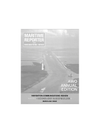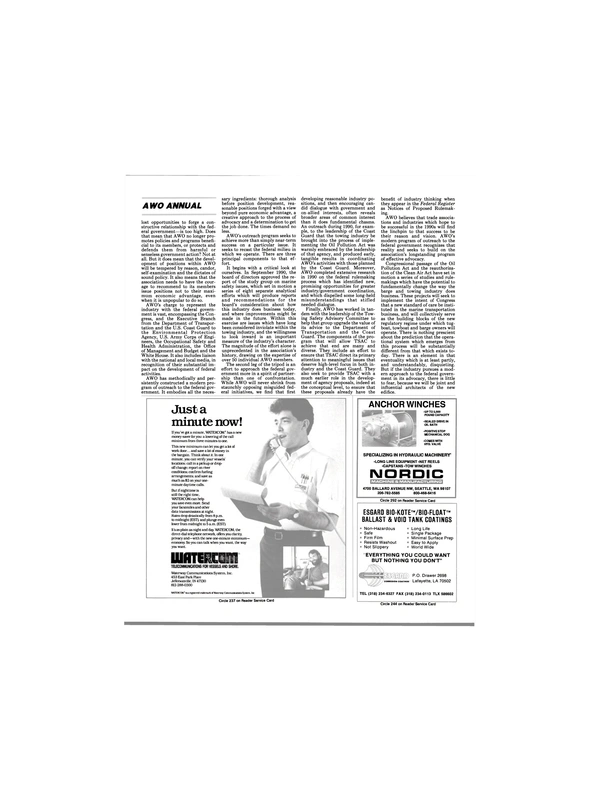
Teamwork, Creativity And Determination
On May 22, 1944, the Certificate of Incorporation of The American Waterways Operators was filed with the Secretary of State of Delaware.
It asserted, among other things, that AWO's purpose was, "To promote harmonious and friendly cooperation among all waterway operators; and gather and disseminate information for their benefit." Later the certificate proclaimed in a flourish of admirable bravado that, "The Corporation (AWO) shall have perpetual existence." These extracts from its charter give the reader some idea of why AWO was formed.
However, reading the charter and first minutes of AWO meetings regrettably yield no real insights into AWO's early persona. Its true character is obscured by the stiff and formal business prose of those times.
I have thought a great deal about today's AWO, now a national trade association which would indeed be unrecognizable to its founders. I'd like to share my thoughts about AWO with you.
The association is well respected, we are told. It has built a considerable record for effectiveness. It keeps its eye on the dollar, not spending foolishly. It jealously guards staying lean, relying on teamwork, creativity and determination to succeed. All rather admirable qualities, I think.
But what is more important to know is what animates today's AWO, what gives it its cachet.
The first quality which sets AWO apart is the extraordinary involvement of its members. Members possess remarkable knowledge of the issues enabling them to provide AWO with its essential direction through informed decision making, and consistently constructive oversight.
AWO's future well-being is insured because its members are heavily invested in that future.
Just four examples of recent events illustrate clearly that member involvement.
In 1990, ten of the association's senior leaders spent months gathering and analyzing information which has produced a strategic plan which charts the way for at least the early years of the decade. Another group of leaders have put their mark on the largest membership campaign in AWO's history, a two-year effort with an ambitious goal of bringing 50 members on board.
And, side by side with these accomplishments is an unprecedented program designed to assist the Department of Transportation . . . at the department's request . . . as it embarks on conducting studies and promulgating new regulations spelled out in the Oil Pollution Act of 1990. Fully 51 AWO members are working in eight small groups, each one set up to produce a comprehensive report necessary for issue resolution.
Anyone would agree that all this represents astonishing member involvement!
Taking on the tough ones, head on, is another AWO trait. For example, the association in early January approved and adopted a guiding set of environmental principles that state, in part, "AWO members are dedicated to continually improving operations in an effort to eliminate environmental incidents and to reduce environmental hazards to an absolute minimum." The association is completely committed to policies and practices which will maximize marine safety and environmental protection.
These principles solidify and articulate that commitment within the barge and towing industry. Just as importantly, they let the American people know that our industry welcomes public attention to our performance, and that our member companies have seized the initiative to do better.
The principles emphasize prevention, responsibility, safety, training, cooperation, and environmental stewardship.
Our goal is zero environmental incidents, coupled with the economic viability of our industry.
A strong industry with a solid environmental reputation is our intent.
Another example. "We are simply spilling too much oil in the water." So said AWO's witness before the June meeting of the National Academy of Sciences Marine Board on hull construction issues relating to oil spill prevention. Members of the audience of engineers, scientists and professional ship managers, startled by the candor of that statement, later proclaimed AWO's testimony ". .
. the most objective we've heard." That kind of candor has become a hallmark of this association.
Yet another. Two years ago AWO, speaking for inland carriers and responding to inquiries from Senators putting together a Federal drought relief bill, said that the industry did not want to be included in the relief bill. "You don't go to the government for a handout when things get tough," said inland barge line executives.
[An official of the Association of American Railroads, corresponding with AWO after reading a news account of this incident wrote, "This rivals the biblical dream of the lions lying down with the lambs!"] Finally, in the waning days of the 101st Congress, Senators and Congressmen received letters from AWO's members which asked them to " . . . support Coast Guard user fees of $10 million to $12 million." The letters said that the industry doesn't like asking for user fees but " . . . we expect to do our fair share in reducing the Federal deficit." Doing what is right . . . a second trait of AWO . . . has built for the industry's national trade association a reputation of incalculable value.
Gaining and preserving the trust of Federal officials opens wide the doors of success.
There are seemingly a hundred reasons why a venture cannot work, or should not even be tried. But AWO always searches for that one way that will produce a victory. For example, in the lengthy and emotion- filled debates leading up to the Oil Pollution Act of 1990, AWO scored on behalf of the industry by sending Members of Congress a technical plan view of a coastal and an inland barge, alongside a plan view of the huge . . . by comparison .
. . Exxon Valdez. Sometimes a picture really is worth a thousand words!
We also improved the painful Coast Guard user fee package somewhat by blanketing Congress with our press release on the industry losing millions of dollars because of the steep rise in diesel fuel prices after Iraq invaded Kuwait.
Finding the way. Taking sensible, manageable risks. A third characteristic of AWO. There is no doubt that recent years have been extraordinarily challenging. Though the future is always somewhat hidden in the mists, I expect no letup in the challenges. But as long as our members maintain a hold on AWO's affairs, as long as we preserve our reputation for telling it as it really is, and as long as we fuel our efforts with large doses of ingenuity, AWO will continue to flourish.
Read Teamwork, Creativity And Determination in Pdf, Flash or Html5 edition of March 1991 Maritime Reporter
Other stories from March 1991 issue
Content
- Avondale Industries Joins International Shipbuilding Partnership page: 5
- Chevron Awards Grootint $111 Million Contract For North Sea Platform page: 5
- Fincantieri Receives Products Carrier Contract Worth $53.5 Million page: 8
- Icebreaker/Passenger Ferry To Be Built By Marystown Yard In Newfoundland page: 8
- Meyer Werft Delivers Fourth Gas Carrier In Series Of Six For USSR page: 10
- Trinity Marine Receives Over $138 Million In Navy Contracts page: 10
- Service Marine To Build 145-Foot Utility Boat For Gilbert Cheramie Boats page: 11
- Sperry Gyrocompass System Receives NMEA Product Award page: 11
- New Prototype Rescue Vessel, Built By Textron Marine For USCG, Credited With Saving Four Lives page: 12
- Avondale Christens 10th In Series Of 16 Auxiliary Fleet Oilers Under Construction For U.S. Navy page: 14
- Atlantic Marine Launches Casino Riverboat 'Emerald Lady' page: 16
- Ingalls Awards Baldt Contracts For Anchor, Chain And Hardware page: 18
- Marine Industries Mobilizes Large RO/RO Barges page: 18
- The Voice Of America's Towing & Barge Industry page: 20
- Teamwork, Creativity And Determination page: 21
- A New Approach To Issue Advocacy page: 21
- The Environmental Wave: Successes And Challenges page: 24
- Effects On The U.S. Fishing Industry By The Anti-Reflagging Act Of 1987 page: 26
- Peterson Builders Sign NSRP Cooperative Agreement With Navy page: 27
- Gulf Copper To Provide Facility, Services For FPSO Conversion page: 27
- MAN B&W Diesel Moves To New USA Headquarters page: 27
- Jacksonville Shipyards Awarded $2.5 Million To Repair Pemex Ship page: 28
- Newport News Names Hardison VP, Quality page: 33
- Avondale Boat Division Licensed To Construct High-Speed Hovercraft page: 33
- Rolla Introduces New Surface Piercing 'Super Propellers' page: 34
- TOWFISH SCANS SEABED— page: 34
- Navy Requests $25 Billion For Shipbuilding, Fleet Maintenance & Repair For FYs 92-93 page: 36
- ASNE 5th Annual Naval Logistics Symposium page: 38
- MAJOR NAVY CONTRACTS page: 39
- U.S. Yards Awarded Navy Ship Repair Pacts page: 40
- 'Arleigh Burke,' First Aegis Destroyer, Conducts Weapons Trials In Atlantic page: 41
- Saab Marine Level Gauges For Navy Oilers page: 41
- PBI Launches MCM-10, USS Warrior, Seventh in Series Of 11 For Navy; Lays Keel For MCM-12, USS Ardent page: 44
- James N. Miller Signs Swath Ocean Agreement page: 46
- Ulstein Hatloe Delivers Polar Research/Passenger Vessel To Rieber Shipping page: 47
- Amoco, China Sign Joint Agreement To Undertake $500 Million Oil Project page: 47
- Norwegian Partners Buy Six Soviet-Owned Carriers For Over $100 Million page: 47
- Sources Of U.S. Oil Imports And U.S. Oil Companies' Role In The Mideast page: 48
- NAVIGATION & COMMUNICATIONS EQUIPMENT page: 50
- Marine Hydraulics International Performs Extensive Navy, Commercial Ship Repairs page: 64
- Hardigg's Rack-Mount Container Protects Electronic Marine Equipment In Transport/Storage page: 64
- Energy And Economic Security page: 66
- Viking Fender Co. Celebrates Anniversary—Introduces New Workboat Fendering System page: 68
- TANO Introduces Mil-Spec VME Modules —Literature Available page: 69
- AESA Delivers World's Largest Tuna Purse Seiner page: 70
- Panama Canal Installs Marine Fendering System From Solidur Plastics page: 70
- Micronautics Offers Free Literature On Tide Predicting Software page: 70
- RGB Spectrum Announces New Flexible Scan Converter page: 71
- Walport USA Announces New Video Safety Service page: 71
- MagneTek Purchases Rights To IBM Electronic Bus-Transfer Technology page: 73
- Aqua Signal Develops New Computer-Controlled Shipboard Lighting System page: 73
- Chris Marine Celebrates 10th Anniversary In Jacksonville, Florida page: 74
- Deutz-Powered High-Speed Xatafoil' Yacht Under Construction At T-Craft page: 81


